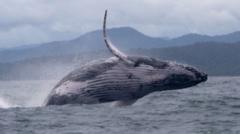In a stunning display of nature's intricacies, a humpback whale has astounded scientists with one of the longest migrations ever recorded. The majestic creature, originally spotted off the Pacific coast of Colombia in 2017, re-emerged years later near Zanzibar in the Indian Ocean, traveling a remarkable distance of at least 13,000 km.
Experts speculate that this incredible journey may be driven by the effects of climate change, which could be affecting the availability of krill—the beloved food source of humpback whales. Ekaterina Kalashnikova, a researcher with the Tanzania Cetaceans Program, remarked on the whale's journey, stating, "This feat is truly impressive and unusual even for this highly migratory species."
Accompanying this article are images showing the same whale near Zanzibar in 2022, providing visual evidence of its extraordinary odyssey. Kalashnikova emphasized that this migration is likely the longest ever documented for a humpback whale, a species known for its extensive travel patterns.
These gentle giants inhabit oceans worldwide, migrating from feeding grounds in cooler waters near the poles to warmer breeding areas closer to the Equator each year. Yet, this particular male's journey has raised questions as it encompassed two distant breeding locations.
The drop in krill populations due to climate change may be pushing these whales to seek out new feeding opportunities. Additionally, with conservation efforts leading to the recovery of whale populations, these magnificent animals might also be exploring alternative breeding territories.
Dr. Kalashnikova highlighted that the whale's travel may be influenced by a combination of global climate changes, increased frequency of extreme environmental events, and the species' own evolutionary responses.
The male whale was part of a group photographed in Colombia back in 2013. After being tracked again in 2017, its subsequent appearance off Zanzibar in 2022 provided a fantastic opportunity for scientists to study its migration path. The sightings correspond to a great-circle distance of approximately 13,046 kilometers—the minimum distance theoretically traveled, though it is likely that the actual route was even longer.
The findings relating to this extraordinary migration have been made possible through the collective efforts of researchers, whale watchers, and citizens contributing photos to the innovative citizen science platform, happywhale.com. The website utilizes artificial intelligence to analyze whale tail shapes, helping to map the movement patterns of these incredible marine mammals.
This significant research has been published in the journal Royal Society Open Science and adds to the growing body of knowledge about the behaviors and challenges faced by humpback whales in a changing world. For those interested in learning more about humpback whales, BBC iPlayer's "The Secret's of Antarctica's Giants" offers a deep dive into these fascinating creatures.




















